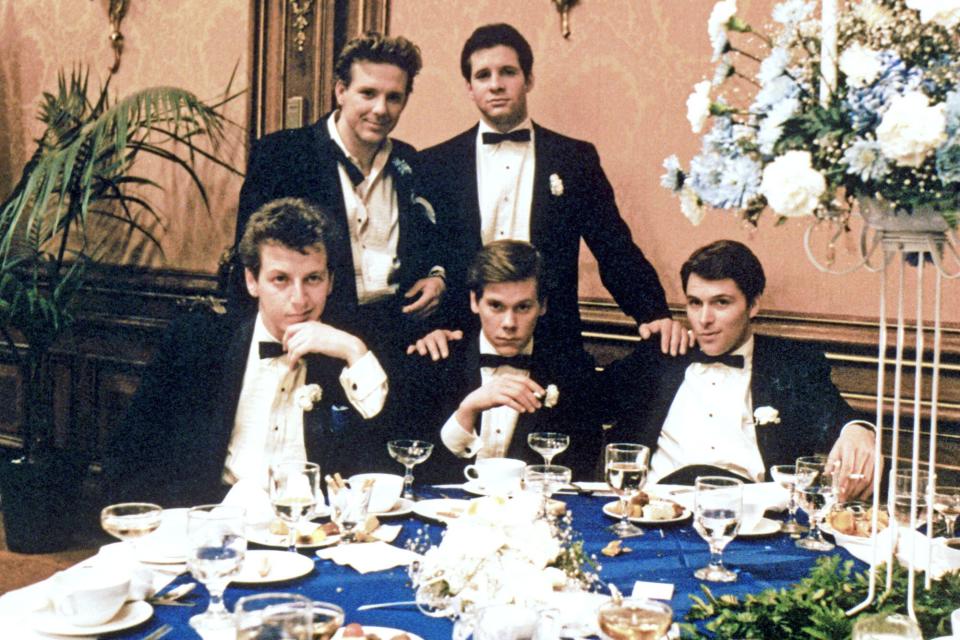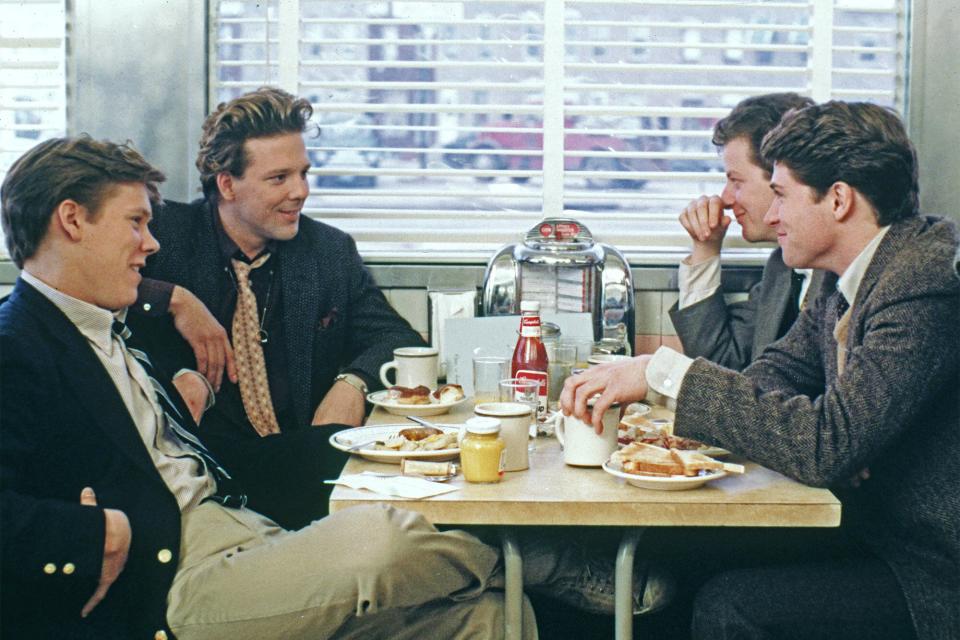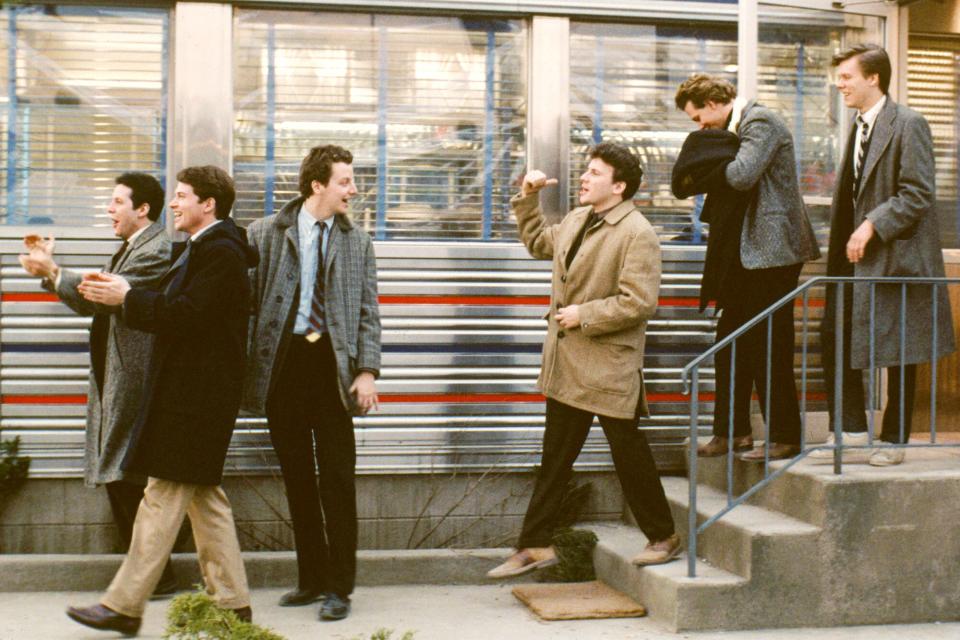Diner at 40: The film's stars reflect on greasy-spoon graveyards, camaraderie campers, and roast beef sandwiches

- Oops!Something went wrong.Please try again later.
- Oops!Something went wrong.Please try again later.
- Oops!Something went wrong.Please try again later.
- Oops!Something went wrong.Please try again later.
- Oops!Something went wrong.Please try again later.
Never mind attaining its status as a cult classic, Diner barely even got released.
The 1982 film by debuting writer-director Barry Levinson trades on its conversational style and slice-of-life vibe. But MGM, the studio behind it, was so confused by it that they resisted putting it in theaters until New Yorker critic Pauline Kael gave it a rave review after a brief run in New York City.
Levinson, then 40, wrote the project — inspired by his own experiences growing up in Baltimore — specifically for himself to direct. "I used to work with Mel Brooks," he tells EW (he wrote Brooks' 1976 comedy Silent Movie and 1977 Hitchcock parody High Anxiety). "At various times, I used to tell him Diner-esque stories about the guys I hung around with. One day he said, 'You should write a script about that.'"
Levinson mulled Brooks' suggestion for several years, struggling to figure out how to craft it into a story. "I had all these pieces, but I couldn't figure out how to put it together," he explains. "Then, the thing that set it in motion is, one day I thought, 'What about if I set it in the five days leading up to New Year's Eve and the wedding?'"
Diner follows a group of twentysomething buddies in 1959 as they prepare for the wedding of their pal, Eddie (Steve Guttenberg). All of them are searching for something — Boogie (Mickey Rourke) for a way out; Shrevie (Daniel Stern) for a connection with his wife; Billy (Timothy Daly) to marry the best friend he loves; Fenwick (Kevin Bacon) for someone to see the intelligence underneath the prankster; and Modell (Paul Reiser) for a sandwich or a ride. But the only thing they can count on are their nights in the diner and the strength of their bonds.
The studio expected a much more straightforward film, not a series of linked vignettes dotted with extensive improv which Levinson cultivated on set. But in the end, MGM's distaste for the entire product worked to Levinson's benefit because they couldn't cut the film into something closer to what they wanted. "They just thought, 'The movie is so bad that there's no sense to even cut it. Just leave it alone, and it'll never be seen.'" the director says. "That's the only reason it's in the form it's in."
Forty years on, Diner is now considered one of the most influential and game-changing movies of its era. It defied the odds and its reputation at the studio to become a classic story of friendship and a showcase for its winning young male stars (many of whom were in the earliest stages of their careers).
Ahead of an in-person reunion at the TCM Classic Film Festival, we caught up with writer-director Barry Levinson and some of his cast to get the behind-the-scenes stories of how Diner became one of the most beloved (and unique) buddy movies of all time.
"We always got the diner."

Turner Entertainment Fell's Point Diner in 'Diner'
The titular diner is the space where all the guys gather to reflect on their romantic failures, their hopes for the future, their fears, and just generally shoot the s---. As Paul Reiser puts it, "Barry always talked about it being like the campfire. You'd go out and you'd be with a girl or whatever, but then you'll all end up back at the campfire, which was a diner, and you'd talk about what you did or what you didn't do or what you wish you had done. The intimacy and the affection was saved for the camaraderie of the guys."
That meant the first order of business for Levinson was to find the right setting for this central meeting spot.
He first scouted real diners in the Baltimore area, but they were all outside of the production budget. Then, he found the perfect space for the classic '50s eatery in the Baltimore suburb of Fell's Point while driving around with cinematographer Peter Sova. It was a vacant lot on the harbor, the Domino Sugar sign in the distance. "Peter was sitting there in the passenger's seat and I said, 'Wouldn't that be a great spot for the diner?'"
He and producer Mark Johnson then visited what Levison dubs a "diner graveyard" in New Jersey. "We were lucky enough to take [our diner] from that diner graveyard and have it shipped to Baltimore," he recalls. "We put it on the piece of land that I saw, and that's how it happened."
After filming wrapped, the diner was returned to its junkyard, but later the city of Baltimore brought it to a new location and transformed it into a vocational training school for those interested in working in the restaurant business.
Levinson was intent on shooting in a real diner rather than a soundstage to lend the film (and its cast of newcomers) authenticity. "It felt so real, and that was also helpful for the actors, as opposed to having two walls and the rest is missing," he says. "You were in a diner and there happened to be some other people there filming you."
The cast all echo this, emphasizing how much the realistic setting informed their performances and gave them a level of comfort that invited the improv and conversational style that defines the action. "The set was designed to invite good work," says Steve Guttenberg.
Kevin Bacon, who at that time had predominantly worked in the theater, was thrilled to have a set that had four walls. "I was like, 'This is so great for an actor because so much of the place and time are already done for you as you create,'" he says.
"If you want to talk, you always have the guys."

Turner Entertainment Mickey Rourke, Steve Guttenberg, Daniel Stern, Kevin Bacon, and Timothy Daly in 'Diner'
Part of what makes Diner work is the easy camaraderie between the pals, the ways they really feel like they've been buddies for years. Though none of the cast knew each other going into the project, it was easy to find that bond over long days killing time at the local Holiday Inn and long nights on set.
Tim Daly, who made his feature film debut (credited as Timothy Daly) in Diner, remembers a broad range of shenanigans at restaurants and bars in the Fell's Point area, including sending fellow cast members outrageously named cocktails. In one instance, he remembers sitting with Bacon and Guttenberg trying to pick up girls, telling the unsuspecting women that he was a specialist who would install plumbing in rotating restaurants. "I would say, 'It's really, really complicated,'" he recalls. "It was terrible. We were just torturing these poor girls, but we thought it was hilarious at the time."
The focal point of their hijinks was a motorhome they all shared that they dubbed the "Camaraderie Camper." The forced proximity, in stark contrast to the individual isolation of a typical movie-shoot trailer, fueled the relationships we see on screen. "We would laugh and we would really just annoy the s--- out of each other," Daly says. "There wasn't enough space and someone would be taking a nap, and someone would be smoking. It created this dynamic that worked for the film."
Guttenberg calls the camper a "forward-thinking" move by Levinson and producer Johnson. "They knew that the more the cast was together, the more we would create better relationships on camera," he says. "Frankly, these guys know a lot of my secrets. When you become intimate with friends, especially when you're working so closely for so long, you begin to divulge yourself and that comfort crosses over to the screen."
Reiser likens the camper to the Marx Brothers stateroom scene in A Night at the Opera. "Friends of Barry's would come in and go, 'I got stories of when Barry was in high school,' and we're going, 'Get this guy out of here!'" he explains. "That alone bonded us more. We'd roll our eyes and be like, 'Who is this guy to come in and tell us stories? We don't need stories.' It was just combustible, like sticking six puppies in a small pen — there's going to be some aggressive play."
"This is why you're so nervous all the time. You have, like, chunks of roast beef in your heart."

Turner Entertainment Kevin Bacon, Mickey Rourke, Daniel Stern, and Timothy Daly in 'Diner'
The film's distinct conversational style stems from a mix of Levinson's approach to the script and a fair amount of improvisation while on set. "When I was writing it, I wanted it to be the most ordinary thing possible," the director says. "That's the way we talk about things. We don't just suddenly have all these profound things pop out of [our mouths]. The real, inarticulate nature of approaching something in the most mundane way becomes fascinating."
The improv came about as a result of riffing on or extending a scene Levinson had already written. "Sometimes it would be no more than we had a little bit of time left at the end of the night and I'd say, 'Why don't we just do a little thing here?'" he remembers. (One thing that wasn't improvised: Eddie's football trivia test, which he requires his fiancée to take — Levinson based that on a real quiz his cousin, also named Eddie, gave his wife.)
The actors' comfort with improvisation varied from cast member to cast member. Both Kevin Bacon and Tim Daly were afraid of the prospect. "I was so terrified and new," says Daly. "I didn't know what to say. I was so scared about it. I mean, my first few days, I didn't know that when you walked into a scene, you had to hit a mark. But I learned immediately that one of the beautiful things about film is that you can capture stuff that's not scripted that might just beautifully describe a scene, so don't edit yourself."
Adds Bacon, "When I got to Baltimore, it became clear to me that we were going to be more fluid than [the script]. I have never really thought of myself as much of an improviser. On set, I felt really nervous about it because I was like, 'I can't really do that, and I'm not so good off the top of my head at being funny.' So, I made the choice that I was going to be the guy that listens."
There was, however, one member of the cast who was well-versed in improv and being funny on the spot: comedian Paul Reiser, who had previously worked exclusively as a stand-up comic. Reiser didn't even intend to audition for Diner. He accompanied a fellow comedian, Michael Kay, to run errands in New York City and went along while Kay auditioned. The casting director liked the look of Reiser and asked him to audition, over his own protestations that he wasn't there to steal his friend's thunder. But he ended up winning the role.
Reiser's character, Modell, originally had only a few lines of dialogue. Levinson had specifically wanted to enlist an experienced comic to punch-up scenes with humor, and Reiser's improv greatly expanded his part. "What I ended up having as a contribution to the film was nothing to do with the script," he says. "It was all Barry pushing and guiding me along the way to just be loose."
That looseness resulted in one of the most memorable scenes in the movie, occurring during the first diner sequence where Eddie and Modell kibitz over a sandwich. "People still quote that scene back to me, 'Roast beef in your heart,'" Reiser says. "I must've said that one night, one time, late at three in the morning, and it lives on."
The interplay between Guttenberg and Reiser, and Guttenberg's exasperation with Reiser is what makes the scene work. "That scene came from how much we liked each other," says Guttenberg. "Paul and I were able to have some fun with it, and we carried it. And Barry smartly allowed us to carry it again for when Paul doesn't have a ride home."
"Now we're older and we're cooler, and we're still hanging out here."

Turner Entertainment Steve Guttenberg, Timothy Daly, Daniel Stern, Paul Reiser, Mickey Rourke, and Kevin Bacon in 'Diner'
Forty years after Diner first hit theaters, its legacy is one that is both personal and professional. For the cast and crew, it gave them a lifetime of memories (most involve Mickey Rourke — Tim Daly giving Rourke the literal shirt off his back when Rourke complimented it; Rourke arriving late to a first rehearsal in a dingy Holiday Inn hotel room wearing a white silk scarf, "dressed like he just walked out of the Lower East Side at three in the morning from a club," remembers Guttenberg).
It also created bonds and real friendships between the guys that lasts to this day. Bacon says that he Zoomed with Reiser, Daly, and Guttenberg multiple times during the pandemic and recently discovered a collection of Polaroids in his attic that featured him and the guys goofing off on set.
For Levinson, it became a calling card and launched his remarkable career as a director, producer, and writer, continuing through films such as The Natural, Rain Man, Bugsy, and Wag the Dog, and with television series like Dopesick. It also established his ability to ponder the past without a highly romanticized level of nostalgia. "I wanted it to feel credible to its time, as opposed to putting a patina on it and making it not real," he says of Diner. "Grease is a fun movie, but it's not real. I wanted to somehow be able to make it as close to reality and find a way to entertain the audience."
In contrast to other 1950s or '60s-set films of the era like American Graffiti, Levinson wanted to tell a story that reflected his own youth without idealizing it. Diner's coming-of-age story is underscored by its setting in the final days of the decade. "1960 is literally days away," explains Levinson. "The '60s are about to happen, and there's going to be big changes that will rock their world. We don't get to see that, but they will."
We get hints of that change in scenes where we see the gang at the movies, the world they know as represented by A Summer Place (1959), and something altogether more confusing in Ingmar Bergman's The Seventh Seal (1957). "A door was opening and we didn't necessarily know what that was all about," he adds. "In a sense, it was saying change is coming." As reflected in these scenes, Diner is a movie about the final days of an era of innocence — for both the guys and the nation as a whole.
Daly worries that some of the film's more problematic takes on gender dynamics (the football test, blurry consent in sexual encounters, etc.) might not land with audiences' today. "It's not just the 40 years [since it came out], but it took place 20 years before 40 years ago," he notes. "I hope people who see it won't judge it by today's standards because the times have changed a lot."
Bacon and Guttenberg are more optimistic, pointing to the film's enduring themes and style. "One of the film's legacies is comedy in a very subtle way," Bacon says. "But it also has a genuine tone of humanity to it. The idea that you can come of age at any point in your life, that it's not a one and done kind of thing — growing up and trying to figure out what being a man is, that's an ongoing process."
Guttenberg puts it more simply: "It more than holds up. It's a piece of cinematic literature."
Diner will celebrate its 40th anniversary with a screening and cast reunion at the Turner Classic Movies Film Festival, which takes place in Hollywood April 21-24.
Related work:

